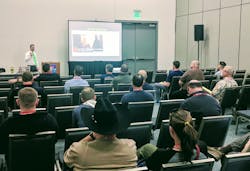FHWorld18: Building a Tradition of Passion Among Firefighters
There’s a missing link in the fire service, a segment that has simply gone awry: a lack of enthusiasm among firefighters. That’s the concern of Lt. Mark Aloan of Columbia County, GA, Fire Rescue, who spoke on the topic “Building a Tradition of Passion Among Firefighters” during his Firehouse World pre-conference session.
Aloan described a fire service environment that seems to focus more on divisions than inclusiveness, and discipline rather than mentorship. Further, he explained that the high turnover rates from the middle ranks as well as difficulty attracting volunteers may be attributed to the lack of passion for the job. Fortunately, he also noted several solutions to approach these issues, and recommended some mental shifts and attitude adjustments that can help foster a culture of enthusiasm.
When it comes to passion for the fire service, Aloan described two types: 1) born passion, which is inherent and has seemingly always been there, and 2) learned passion, which is sometimes groomed by others and often discovered later in life. He stressed that these types of passion are equal, but that some members will judge others who didn’t come into the fire service in the same way as them. Instead of focusing on differences, Aloan suggests taking the opportunity to show newer firefighters how great the fire service can be, particularly if they don’t have the same background or history with it. Further, newer firefighters may not have the same level of experience due to fewer fire incidents, but it’s up to the more senior members to find different ways to teach them.
Some of the issues related to a lack of enthusiasm can unfortunately be linked to tradition, Aloan said, explaining that firefighters can get into a mentality of “that’s just how it’s always been done” or judge others for having different ideas. The key, Aloan said, is to refocus the negative traditions toward the more positive elements of traditions related to morale and pride in one’s work.
Aloan said some people have a bad image of passionate firefighters, assuming they want to change everything or make life at the station harder, which is not the case. Firefighters with enthusiasm are sometimes punished for their high expectations, being told to back off or slow down. But this judgment is often spurred by people who are uncomfortable with their level of passion for the job—or worse yet, who are simply uneducated, insecure and afraid of change.
Aloan offered advice for steering clear of negativity and instead fostering a culture of passion and enthusiasm among firefighters:
- Encourage people to speak up, but don’t turn them away or judge them if you don’t agree with their ideas.
- Don’t judge firefighters for asking questions; answer the questions!
- There will be people who don’t show enthusiasm, but they have it inside them; you simply have to lure it out.
- Take the time to nurture probies and develop their excitement for the job—and remember what it was like to be a probie in order to keep things in perspective.
- Don’t rob firefighters of their enthusiasm simply because you’re upset about something; in other words, don’t project your negativity onto others.
- Consider who you might be taking for granted at your department, and acknowledge their work.
- Take time to reward deserving members through employee recognition programs, awards, medals and ribbons, and good write-ups.
- Be realistic with people. Don’t use enthusiasm to dismiss difficult situations, as people will feel like they can’t trust you.
- When it comes to difficult members, do what you can to salvage them; don’t immediately throw them under the bus.
- Encourage people to read about the industry, learn about major fire incidents and enhance their education.
- Take the job seriously—details matter. Others will see this and follow suit.
- Get out of the firehouse and into the community so community members see the value of your department.
- Master your craft. You can never train enough for a job that can kill you.
- Avoid comparing your department to other departments.
- If you want your members to act like adults, treat them like adults.
- Give members added responsibilities to give them more ownership in their work. This could involve mentoring or special programs, a new training role or an opportunity with PR.
- Use social media to promote educational classes and show off your crew.
Following these guides is a great way to set an example for other members, Aloan said, and this helps breed enthusiasm and excitement for the job. It’s important, he added, to remember that all departments have great members; it’s just a matter of identifying them and cultivating their passion for the job—and that takes work.
About the Author

Janelle Foskett
Janelle Foskett served as editorial director of Firehouse Magazine and Firehouse.com, overseeing the editorial operations for the print edition along with working closely with the Web team.
